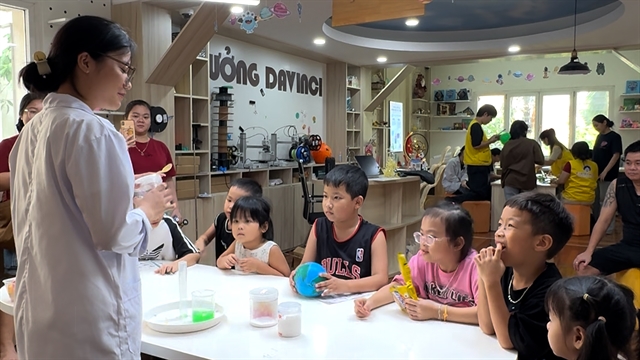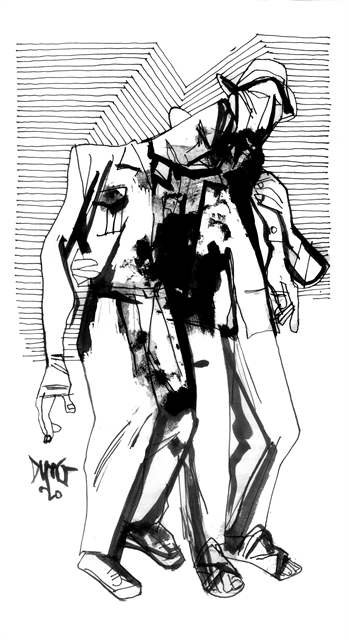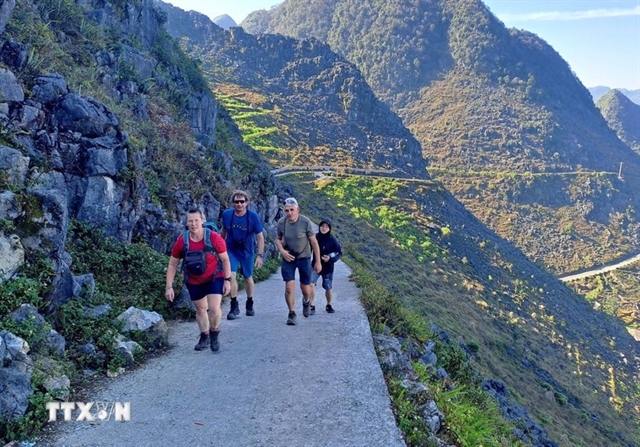

Chu Cẩm Phong (1941 – 1971), whose real name was Trần Tiến, was born in what was formerly Hoi An Commune in the southern central province of Quảng Nam. His father was a municipal military officer during the French resistance. His mother was part of a secret communist cell also operating in Hoi An during the American resistance. In 1954, Chu Cẩm Phong accompanied his father to relocate to North Vietnam, studied at secondary schools for Southern students, and pursued a bachelor’s degree at the former University of Hanoi’s Department of Literature.

|
*Excerpts from Chu Cẩm Phong’s War Diaries
Saturday, 22-7-67
Took to the road on the night of the 19th. Halfway through that morning, I started to feel sick, really sick. At lunch I couldn’t eat. In the afternoon we had to leave, having no time to cook. Thảo found me too worn out, so when we reached the train track, he dragged me to nearby houses to ask for some cooked rice. We stopped at a house and were offered cooked rice mixed with dried sweet potatoes. The landlady forced me to eat but I couldn’t, my tongue tasting very bitter. Thảo told me to stay, but I said no. Thinking about a dangerous journey ahead in such an exhausted condition, I did feel worried. Yet I recalled stories about some soldiers launching an assault while having a fever, and hoped that in tense, desperate situations, I would forget my pain.
Our group wasn’t big. Besides the two of us, there was also a permanent district party committee cadre, another guest, three armed liaison soldiers, and a quite old man who acted as our guide. Later I had the opportunity to get to know this old fellow, a truly fearless comrade who tended to be a little reckless since our early dark days. He loved to drink. On the following day I had the chance to look at his face, which was always red. His eyes winked constantly and cutely, and his laughter felt very open, unrestrained. I didn’t like the district committee guy though. He seemed rough but chicken-hearted, and liked to boast.
It was strenuous traversing the road. The moon on the 12th of the lunar month shone brilliantly, hanging high above an immense field. No sooner did our group cross a section of the road than gunshots exploded. Machine guns of different sizes fired off first, to be followed by mortars, and a few minutes later cannons were shot toward us from Bình Liên District’s military headquarters. Scores of flares discharged from below lined up quaveringly in the sky, overshadowing the gentle and clear moonlight. This stretch of road was stuck among three fortifications: cannons could be fired from the district, commune, and Tranh Slope military bases. Our group met a few wounded soldiers and learned that a South Korean troop had ambushed and fired at a marching district company of ours (this South Korean gang was particularly fierce and dangerous). The company commander had made a careless mistake that led to 16 deaths (including the political commissar) and the loss of four light machine guns plus a few rifles.
On the road, I didn’t feel anything but feverish, crushed like a piece of paper. As I walked by the deep trenches filled with bristling spikes and barbed wires, I kept imagining falling into them. After crossing that section of the road, I threw myself to the ground, lying on the bank above the field to rest. That night we walked until 1 or 2 am.
At first I thought it was an ordinary fever that could be cured with Delaguine medication. Then I realized I might have caught typhoid. Before I was done thinking, the disease knocked me down completely. I was flat on to the ground in wretchedness.
No sooner did we arrive than Thảo set off to work. He went scouting.
The party secretary of Tịnh Hoà Commune (Sơn Quang District) sent me to a herbalist named Trang.
Yesterday and the day before my fever grew severe. My whole body was on fire. I tried to close my hands, but had to open them instantly because they felt like two lumps of burning coal. Yet inside I felt cold, shivering. My head ached for 24 hours straight, and felt like bursting in whatever direction I turned. I kept vomiting, night and day, sometimes twice in a row. Whenever I went for a poop, I had to lean on a stick and try my utmost not to fall.
The herbalist has prescribed for me two packs of Chinese herbal medicine, but I only managed to drink a few drops from each pack before vomiting. We had to throw it all away. The herbalist then conducted a ceremony to pray for me, but my headache persists.
Every day I can only swallow half a bowl of plain rice porridge which is cooked very well, with lots of water and a little salt. When the herbalist’s wife cooks porridge with fish, I vomit upon smelling it.
Whether this herbalist is capable or not I don't know very well, but I’m moved by all of the kindness and care that the whole family showers on me. At midnight the daughter has to wake up to cook porridge for me. Over meals when everybody is eating, I suddenly vomit noisily but no one utters a word of complaint. Everyone looks worried when they see me panting and struggling to swallow my porridge in vain. Mai, another daughter who works as a local soldier and has dropped by her house during a work trip, said with suppressed warmth, “Please eat and get well soon.” Bốn, another woman in the house, also addresses me gently. As for the landlord and his lady, they can only sigh at the sight of me.
Sunday, 23-7-67
It’s strange but without almost any medication, I feel better today. Since yesterday I’ve tried to jot down a few lines to train my hand literally as well as figuratively, physically as well as artistically. Now I can eat a few spoonfuls of rice and walk into the yard without a stick.
Early this morning, as I lay inside listening to the sound of the irrigation wheels rolling in the field, I felt very excited. The herbalist’s house is located right in the middle of a field, enwrapped by the light greenness of the rice plants. This year the upper source of the river has somehow been destroyed by the enemy so water isn’t coming down as it should. So farmers here have to wake up early and work the irrigation wheels. The field has been weeded, but faces a shortage of water. Another disaster is pests which are devouring the plants, so the farmers have to react quickly and spray pesticide on moonlit nights. Cannons from the nearby sea and fortifications bombard the hamlet and the field day and night. These days, to grow rice is also to fight in a battlefield.
This is what I gather with my still weak ears from within my wattle fortification.
Monday, 24-7-67
Yesterday I felt quite well, so Thảo dropped by and asked me to visit Phòng, the political officer of the communal military command. It only takes 20 minutes to walk the distance one way, yet upon getting home, I fell ill again.
Then I felt better right away after gulping down a dose of Chlorocid (without the herbalist’s knowledge to avoid hurting his professional pride).
Tuesday, 25-7-67
At first I intended to let Thảo go to Bình Sơn Commune alone, and I would rest for a few more days before travelling to Tịnh Khê Commune (Sơn Mỹ District), because I don’t feel strong enough yet for a trip to Bình Sơn. Yet I thought twice and found such a plan inconvenient, so I tried to join Thảo for a trip to Tịnh Khê today. I knew I’d be knocked down again. Indeed, when we arrived at Mr. Hoà’s house, I started to feel thirsty and deadly weary and had a headache.
Mrs. Hòa has just delivered and her son is yet to be a month old. The other day a shell fragment tore the cradle apart as the mother was taking her child down to the shelter. So today she is sewing it up. Mothers already endure great pain to give birth and squeeze every ounce of nutrition from their bodies to feed their babies, and now have to protect their children from wars too.
Friday, 28-7-67
For the past four days I’ve felt a sharp pain throughout my body, especially from 1 pm straight to the following morning. I often faint. Whenever possible, I try to sit up to fight these devilish bouts but can’t hold on for long. I feel exhausted. On the first afternoon when I had these symptoms, a communal nurse came to give me an injection to boost my health, then promised to return the following morning. Yet for the last three days, I haven’t caught any glimpse of him.
The more I think about my futile work trip, the more I worry. I’ve left Tịnh Hoà Commune without achieving anything, and may not find the materials I want at this commune either. If this situation drags on for four or five more days, I may not be strong enough.
For the past three days the enemy forces from Voi Island and the other side of the sea have been attacking the Cổ Lũy opening. Local soldiers and guerillas have fought back, killing 20 enemy soldiers on the first day. The remnants of that troop fled to Bãi Hamlet, leaving behind two chaps. Right then a middle-aged man returned from his fishing trip. Those chaps asked him to sail them home. He sighed and said, “You two are carrying your full weaponry, so if the liberation soldiers find us, they’ll kill both you two and me.” “So what should we do?” they asked. The man answered, “Let me hide your weapons for you until you can take them back.” Then he drove his boat to the middle of the sea and sunk it, killing the chaps.
The enemy forces have rebounded with constant bombardments night and day. Helicopters have been flying over to drop flares and fire machine guns insanely for the past few nights.
Saturday, 29-7-67
A strange new military physician came to the commune. For the past four days several people have gone to fetch him, even two to three times a day, to show a sense of emergency. He has always promised to come shortly then forgotten all about it. Not until yesterday afternoon did he show up, ask a few questions, and put on his stethoscope then say, “I’ll handle this.” Then a whole day passed before he sent somebody this afternoon to inquire after me (what a joke!) and gave me eight Aralen pills wrapped in a piece of flying horse cigarette rolling paper. Have I caught malaria?
Tuesday, 1-8-67
Only after the physician gave instructions did the communal nurse dare to treat and visit me regularly. But my conditions hardly improves. I still feel tired, and often lose my balance. I try to eat to regain my health without success. There isn’t anything to eat either.
Mrs Hòa’s newborn son has been crying non-stop for several days for some unknown reason. He keeps crying until he becomes hoarse and exhausted.
Mrs Hoà is kind but exasperating. She shouts at her children all day long, and sometimes scolds her husband. Her voice is shrill. Anything can provoke her to nag sullenly at her husband and children, from a scattered piece of firewood to a hose in the yard, from a jar of water to a coconut leaf. Is this perhaps because she has been tied down to bed for too long after delivery and her baby has been pestering her all night? I can’t stand her. Her shrill, shrewd voice makes my head ache.
The older daughter named Khương goes to the market twice a day. In the morning she goes to the enemy’s zone to buy rice and cigarettes and sell coconuts and other stuff. In the afternoon she goes to the communal market in the liberation zone. She’s only 15 and has a small body, and a bright, graceful, clever face. She’s passionate about her trading and profit making. For a child such a life is more pitiful than laudable. Yet she knows she makes money so she treats her parents somewhat impertinently. Sometimes she also talks to her father with that shrill voice.
Mr Hoà is very amiable. He has a post at the commune’s self-management committee, works hard all day long, and then stays up late to grind rice. At night he even wakes up to boil water and make milk for me.
He’s good-natured and soft-spoken. He never complains and always smiles.
Wednesday, 2-8-67
Only after taking 10 sugar-coated Tinospora crispa pills, eight Aralen pills, and 10 Delaguine pills did my fever subside. Now sometimes my eyes suddenly turn dark and remain so for a long time. Or as I sit and look out at the coconut trees in the yard or the mangrove palms further away, they keep wavering and tilting. I practice walking every morning and afternoon. This morning I managed to walk further, almost twice as much as yesterday, about 100 metres.
For the past several days, the whole family has given up their only bed and torn woolen blanket to me and lay on the ground instead. I try to find something to do to make up for lost time. As I lie on my bed, I often listen to Mrs. Hoà and her old neighbours who come over singing lullabies. Some of these songs are great, so I take out a pen and write them down. After jotting down a few lines, I feel tired and have to lie back and pant.
I haven’t gained anything in this trip. I’ve lost time and haven’t found any material I want. I joke to myself that after the trip, I could only write an article about how to cure typhoid and malaria, and a second one with the title: ‘The Feelings of a Typhoid Patient’. VNS
Translated by Đỗ Linh
*Chu Cẩm Phong (1941 – 1971), whose real name was Trần Tiến, was born in what was formerly Hội An Commune in the southern central province of Quảng Nam. His father was a municipal military officer during the French resistance. His mother was part of a secret communist cell also operating in Hội An during the American resistance. In 1954, Chu Cẩm Phong accompanied his father to relocate to North Việt Nam, studied at secondary schools for Southern students, and pursued a bachelor’s degree at the former University of Hà Nội’s Department of Literature.
In his third year in 1963, Phong was admitted to the Workers Party of Việt Nam. Graduating among the top of his class (the literature department’s fifth class since its establishment), he was awarded a full scholarship to continue his graduate studies abroad. Yet Phong turned down that offer and opted to join the southern battlefield at the end of 1964.
Earlier in his military service, Phong worked as a reporter for the Việt Nam News Agency. Later he wrote and edited for Central Liberation Arts and Literature Magazine and was appointed Secretary of the Arts and Literature Sub-committee of the Military Zone No 5 Propaganda and Training Committee. Whether at work or in daily life, Phong was known for being an exemplary communist cadre.
On May 1, 1971, in an extremely unequal battle fought against overwhelming enemy forces attacking from above from under a secret trench at Vinh Cường Hamlet in former Xuyên Phú (today’s Duy Tân) Commune in Duy Xuyên District in Quảng Nam Province, Phong and four of his comrades were killed. The heroic soldier, journalist and writer left behind a great deal of valuable writings.
The last diary he carried with him was thought to have been destroyed but turned out to be carefully preserved by a South Vietnamese officer. After Đà Nẵng City was liberated, that officer sought out and gave the diary to poet Bùi Minh Quốc, also an arts/literature cadre and a close friend of Phong.
In 2000, Literature Publishing House combined Phong’s last diary and earlier entries which had been preserved by poets Thanh Quế and Ngô Thế Oanh during the war at a mountainside office into Nhật ký chiến tranh (War Diaries). This most important legacy of writer Phong went on to be awarded a prize by the Việt Nam Writers’ Association.
In 2005, Đà Nẵng Publishing House published Tuyển tập Chu Cẩm Phong (Chu Cẩm Phong’s Collection) that comprises the writer’s short stories, notes and also diaries. In February 2007, Phong was posthumously awarded Vietnam’s highest recognition for the field, the State Prize in arts and literature. In March 2010, the late writer also received the military honorific of Hero of the People’s Armed Forces, becoming the first member of the Vietnam Writers’ Association to be so recognised.
According to poet Bùi Minh Quốc, the latest edition of Phong’s War Diaries was edited by Quốc himself and sent to writer Đặng Vương Hưng, also a war veteran who acted as the project’s head editor. Published last September, War Diaries is based on the following materials:
A copy of Phong’s diaries dated from July 11, 1967 to January 11, 1970. Phong gave these entries to poet Thanh Quế before leaving for a work trip at the end of March 1971. These dairies were kept at their mountainside office and entrusted to poet Ngô Thế Oanh when Thanh Quế in turn had to leave for work. In 1975 Oanh returned the diaries to Phong’s family in Hội An.
The last diary dated from January 12, 1970 to April 27, 1971. It was taken from the secret trench, fell into the hands of former South Vietnamese military officer and teacher Hoàng Đình Hiểu, and eventually reached poet Bùi Minh Quốc.
Three earlier editions of War Diaries published for the first time in 2000 by Literature Publishing House, for the second time in 2005 as part of Chu Cẩm Phong’s Collection by Đà Nẵng Publishing House, and for the third time in 2011 by Writers’ Association Publishing House.
Chu Cẩm Phong’s writing career was short, lasting just three and a half years. In those years, the writer also had to handle numerous other tasks besides writing and thus seemed yet to reach his full potential in his notes and short stories. Nevertheless, through the entries he hurriedly jotted down amidst fierce battles, readers are treated with an extremely rich source of historical materials, astute observation, subtle and quick intuition of human action, and a simple but vivid writing style, promising what might have been achieved in more fortunate circumstances. Throughout these visceral texts, one encounters a protagonist in his daily struggles filled with activities and concerns, laughter and sadness, love and anger and reflections.




.jpg)